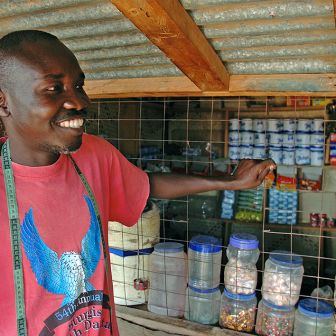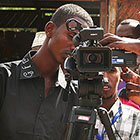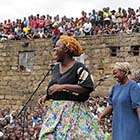A CURIOUS THING happened in Kenya the other day: President Mwai Kibaki called a press conference. Kibaki, who is 77, does not care much for the media. Soon after I arrived in Nairobi in 2004 I tried several times to arrange an interview; I was not seeking a story, but an insight into the aloof but seemingly genial man with the job of unlocking Kenya’s vast potential after the venal era of Daniel Arap Moi. My faxes and emails to Kibaki’s press service always went unanswered. When I followed up with a phone call, I would be informed politely that the president, caricatured in cartoons asleep at his desk or with a golf putter in hand, was unfortunately too busy. This was nothing personal. No journalist, foreign or local, has been granted the honour of a one-on-one interview since 2003.
So when word went around that Kibaki would be addressing the media at his State House residence, in only his second or third press conference, it seemed certain that a grave matter was to be discussed. Perhaps the hunger crisis, the spate of corruption scams in various ministries or the wave of executions by Kenyan police that prompted a scathing new report by Philip Alston, the Australian law professor who serves as the UN special rapporteur on extrajudicial, summary or arbitrary executions? Instead, the local journalists present – the large foreign press corps based in Nairobi was not invited – were treated to seven minutes of bizarre theatre on the subject of… polygamy.
“I want to make it very clear that I have only one dear wife, Lucy, who is here, and I do not have any other,” Kibaki said, with the stony-faced First Lady at his side and the police chief behind him. The alleged “other” is Mary Wambui, whom he is said to have married under customary law in the Seventies. Anyone suggesting that he was a polygamist would see him in court, Kibaki said, before an irate Lucy tore into the press.
The Mwai and Lucy show, whose YouTube clip has been viewed more than 51,000 times, left the media delighted – there was now a lighthearted story to write about the president’s marital affairs. But it was also revealing. Rumours about Kibaki’s health have swirled for years. For a while this worked in the president’s favour, allowing his weak or flawed leadership to be attributed to “the bad people around the president.” But Kibaki spoke off-the-cuff in English, and appeared fully aware of what he was saying.
And then there was the public reaction. A subsequent poll conducted by a television station revealed that four in five people did not believe what the president had said, a reflection of the degree of mistrust in government that exists in Kenya today.
Perhaps the public’s cynicism should have been no surprise, considering the record of those who often speak for the normally mute president and his cabinet. The government mouthpiece is Dr Alfred Mutua, who owes his title to a PhD in communication and media from the University of Western Sydney, and also finds time to write, produce and direct a bad television show about a fictional police unit called Cobra Squad.
Dubbed “Comical Ali” by some, after the inept former Iraqi information minister, Mutua has in recent years become famous for statements mixing recklessness and half-truths. Like his police counterpart, Eric Kiraithe, he loves to talk, or rather lecture, but only on his terms. Calls seeking comment on a story pertaining to the government or crime – or, increasingly, both – are seldom answered.
A few days after Kibaki’s polygamy speech, Mutua made serious allegations against a human rights organisation. The Oscar Foundation, run by Oscar Kamua Kingara, had been documenting extrajudicial killings by police since 2007, particularly murders of alleged members of the criminal Mungiki gang. Kingara and his colleague John Paul Oulu had briefed Philip Alston in late February, during his investigation into the killings.
Now Mutua, in his weekly media briefing, was accusing the Oscar Foundation of being a front for Mungiki. Kingara’s colleagues in civil society were appalled at the accusation; what evidence did the government have, they asked, and why was Kingara not arrested if this was the case? Kingara himself protested, but only for a few hours. That evening he and Oulu were gunned down as they sat in traffic on a busy Nairobi street, less than a mile from State House.
Like many foreign reporters in Nairobi I had reported on the original story about Alston’s findings, in which he called for the police chief and attorney general to be sacked, enraging Kibaki’s government. It was not much of a leap to deduce that the state must be the primary suspect in the assassination.
The government’s opacity makes the local press a crucial source of information and analysis. My day begins with reading the Nation, the Standard, the Nairobi Star and Business Daily, all very decent newspapers. But in this case some of them acted irresponsibly, describing the two slain men as “Mungiki activists” – echoing the government line – in headlines the following day.
Were they under pressure to do this? While Kenya’s press is freer than in neighbouring countries, there is occasionally blatant intimidation – such as Lucy Kibaki storming the Nation newsroom after midnight, or the government raiding the Standard’s offices in 2006. There is also more subtle harassment; a call from the intelligence services, or a letter from a firm of lawyers.
William Pike, the managing director of the Nairobi Star, which launched in 2007, recently showed me two thick files containing libel paperwork. Kenya’s extremely generous libel laws allow anyone with power or money or, in the case of politicians, both, to threaten to sue over the most innocuous stories. The “drip, drip, drip” of lawsuits cost money and wears you down, Pike said – and self-censorship is the inevitable result.
My libel run-ins have been limited; a threat from Gideon Moi, son of the former president, to sue the Guardian over graft allegations turned out to be hot air. In general foreign journalists are simply ignored by the government and powerful individuals. The best part of my job is when I am able to return the compliment.
Jetting around the country has become far easier than when I first arrived. Using the internet I can book a cheap flight to Mombasa on the coast, Kisumu on Lake Victoria, or Eldoret in the Rift Valley, and be on the ground there in a few hours. The cliché about Kenyans’ friendliness is warranted; researching stories about ordinary people, no matter the topic, is rarely a chore. Even those people who have extra reason to feel the politicians’ aloofness due to their own remarkable achievements are often humble and helpful.
During last year’s post-election chaos I flew to Eldoret, where the worst violence was taking place, to write a story on how the athletes were faring. Within minutes of landing I had arranged a meeting with Ezekiel Kemboi, then the reigning Olympic steeplechase champion, who agreed to meet me at a hotel in two hours. He showed up late, and must have sensed my irritation.
“Sorry,” he said. “I forgot to tell you that I was sixty kilometres away when you called.” •





